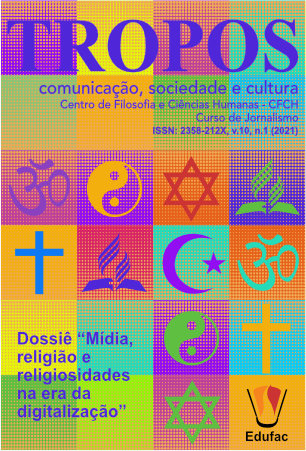MORMONISM AS MEME IN GOVERNMENT-SPONSORED INFORMATION OPERATIONS ON TWITTER
Keywords:
Church of Jesus Christ of Latter-day Saints, Mormonism, information operations, social media, TwitterAbstract
A general suspicion of Mormonism in American politics and media dates back to the 19th century and continues today. Weber (2019) has described Mormonism as a "meme" that is malleable enough to symbolize different things for different audiences in different contexts. In this study, I examine the presence of "Mormonism as meme" in 511 posts composed by government-sponsored Twitter accounts as part of information operations before, during, and after the 2016 U.S. presidential election. I retrieved these posts from a dataset of government-sponsored tweets made available by Twitter and used a mix of computational and human methods to determine: 1) which countries used Mormonism as meme, 2) whether government-sponsored accounts originated or amplified these messages, 3) what identities government-sponsored accounts adopted, and 4) how government-sponsored accounts used Mormonism as a meme. This study's results indicate that six governments invoked Mormonism as part of their information operations during this time frame. Venezuela pursued a strategy that depended on using pro-Trump accounts to repeatedly share messages describing Mormons as communitarian and insular. Other countries (including Russia and Iran) pursued more subtle strategies, more often retweeting others' posts than writing their own. However, they still invoked aspects of Mormonism that called into question its compatibility with liberal, conservative, or broadly American values. As a whole, these posts correspond with both Weber's (2019) description of Mormonism as malleable meme and information operations' twin purposes of influencing the 2016 election and dividing Americans.
Downloads
References
BALMER, Randall; RIESS, Jana. Introduction. In: BALMER, Randall; RIESS, Jana. Mormonism and American politics. New York: Columbia University Press, 2016.
BASTOS, Marco; FARKAS, Johan. “Donald Trump is my president!”: The Internet Research Agency propaganda machine. In: Social Media + Society, v. 5, n. 3, 2019.
BOWMAN, Matthew. The Mormon people: The making of an American faith. New York: Random House, 2012.
COPPINS, M. Trump secretly mocks his Christian supporters. The Atlantic, 2020, 9 September. Disponível em https://www.theatlantic.com/politics/archive/2020/09/trump-secretly-mocks-his-christian-supporters/616522/. Acesseo em 30 November 2020.
CROPPER, Corry; FLOOD, Christopher. M. Mormons in Paris: Polygamy on the French stage, 1874-1892. Bucknell University Press. Lewisburg, Bucknell University Press, 2021.
DECKER, Mark T.; AUSTIN, Michael. Peculiar portrayals: Mormons on the page, stage, and screen. Logan, Utah State University Press, 2010.
DIRESTA, Renee; SHAFFER, Kris; RUPPEL, Becky; SULLIVAN, David; MATNEY, Robert. The tactics & tropes of the Internet Research Agency. New York, New Knowledge, n. d.
FIESLER, Casey; PROFERES, Nicholas. "Participant" perceptions of Twitter research ethics. Social Media + Society, v. 4 n. 1, 2018.
FLETCHER STACK, Peggy. Mitt, Mormonism, and the media: An unfamiliar faith takes the stage in the 2012 U.S. presidential election. In: BALMER, Randall; RIESS, Jana. Mormonism and American politics. New York: Columbia University Press, 2016.
HAWS, J. B. The Mormon image in the public mind: Fifty years of public perception. New York, Oxford University Press, 2013.
HINDMAN, Matthew; BARASH, Vlad. Disinformation, 'fake news,' and influence campaigns on Twitter. Miami, Knight Foundation, 2018.
JONES, Jeffrey. M.). Atheists, Muslims see most bias as presidential candidates. Gallup, 2012, 21 June. Disponível em https://news.gallup.com/poll/155285/Atheists-Muslims-Bias-Presidential-Candidates.aspx. Acesseo em 30 November 2020.
LANDIS, J. Richard; KOCH, Gary. G. The measurement of observer agreement for categorical data. Biometrics, v. 33, n. 1, p. 159-174, 1977.
LEIBOVICH, Mark. Romney, defying the party he once personified, votes to convict Trump. New York Times, 2020, 5 February. Disponível em https://www.nytimes.com/2020/02/05/us/politics/romney-trump-impeachment.html. Acesso em 30 November 2020.
LINVILL, Darren L.; BOATWRIGHT, Brandon, C.; GRANT, Will J.; WARREN, Patrick L. "THE RUSSIANS ARE HACKING MY BRAIN!" Investigating Russia's Internet Research Agency Twitter tactics during the 2016 United States presidential campaign. Computers in Human Behavior, v. 99, p. 292-300, 2019.
LINVILL, Darren L.; WARREN, Patrick L. Troll factories: Manufacturing specialized disinformation on Twitter. Political Communication, v. 37, n. 4, p. 447-467, 2020
LIPKA, Michael. U.S. religious groups and their political learnings. Pew Research Center, 2016, 23 February. Disponível em https://www.pewresearch.org/fact-tank/2016/02/23/u-s-religious-groups-and-their-political-leanings/. Acesso em 30 November 2020.
LUKITO, Josephine. Coordinating a multi-platform disinformation campaign: Internet Research Agency activity on three U.S. social media platforms, 2015 to 2017. Political Communication, v. 37, n .2, p. 238-255, 2020.
LUKITO, Josephine, SUK, Jiyoun; ZHANG, Yini, DOROSHENKO, Larissa; KIM, Sang Jung; SU, Min-Hsin, XIA, Yiping; FREELON, Deen; WELLS, Chris. The wolves in sheep's clothing: How Russia's Internet Research Agency tweets appeared in U.S. news as vox populi. The International Journal of Press/Politics, v. 25 n. 2, p. 196-216, 2020
MAFFLY-KIPP, L. F. The double legacy of Mormons. New York Times, 2012, 30 January. Disponível em https://www.nytimes.com/roomfordebate/2012/01/30/what-is-it-about-mormons/the-double-legacy-of-mormons. Acesso em 30 November 2020.
MAUSS, Armand L. The angel and the beehive: The Mormon struggle with assimilation. Urbana, University of Illinois Press, 1994.
NEWPORT, Frank. Bias against a Mormon presidential candidate same as in 1967. Gallup, 2012, 21 June. Disponível em https://news.gallup.com/poll/155273/Bias-Against-Mormon-Presidential-Candidate-1967.aspx. Acesso em 30 November 2020.
PRINCE, Gregory A. Gay rights and the Mormon church: Intended actions, unintended consequences. Salt Lake City, University of Utah Press, 2019.
STUART, Joseph. Mormon votes are valued. Too often Mormon convictions are not. Religion & Politics, 2020, 11 February. Disponível em https://religionandpolitics.org/2020/02/11/mormon-votes-are-valued-too-often-mormon-convictions-are-not/. Acesso em 30 November 2020.
SUOMELA, Todd; CHEE, Florence; BERENDT, Bettina; ROCKWELL, Geoffrey. Applying an ethics of care to internet research: Gamergate and digital humanities. Digital Studies/Le champ numérique v. 9, n. 1, 2019.
TWITTER. Information operations. Disponível em https://transparency.twitter.com/en/reports/information-operations.html. Acesso em 30 November 2020.
WEBER, B. R. (2019). Latter-day screens: Gender, sexuality & mediated Mormonism. Durham, Duke University Press, 2019.
Downloads
Published
How to Cite
Issue
Section
License
Transferência de direitos autorais:
Declaro que após aprovado para publicação a Revista Tropos editada pela Universidade Federal do Acre (UFAC), passará a ter os direitos autorais do trabalho, que se tornarão propriedade exclusiva da Revista, sendo permitida a reprodução total ou parcial desde que devidamente referenciada.

